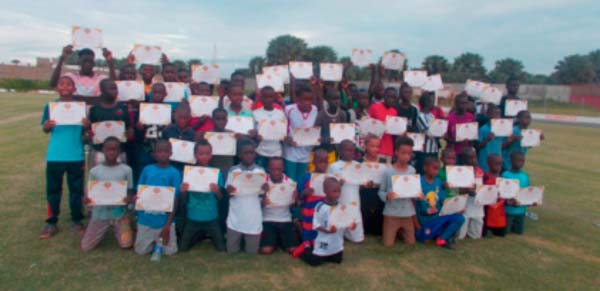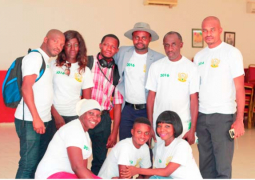
(Issue, Monday,19 September 2016)
The
2016 Qfootball summer camp participants were on Friday certificated at a
ceremony held at Qcomplex in Bijilo.
The
2-month camp held at the Qfootball soccer school brought together 105 kids
between the ages of 7 – 16. Twenty one
(21) of the participants came from Qgroup while 84 came from the public.
During
the camp, the kids were divided into 3 categories based on their ages: 7-10,
11-13 and 14-16. They also had test
matches with other academies during the camp.
Speaking
on the occasion, Alhaji Amat Cham, coordinator of the camp, said the camp was
organised in other to contribute to football development in the country as well
as catch the players young so as to easily refine their raw talents.
Cham
who was also head coach of the teams added that as coaches they had a good time
with the kids. He said the kids enjoyed
what they were doing at the camp for they had called for the extension of the
camp.
The
Qfootball camp coordinator said the rationale for staging the camp was to
contribute to the improvement of football in the country.
Lamin
Kabba Bajo, president of Gambia Football Federation (GFF), hailed Qgroup for
the initiative and thanked parents for allowing their kids to take part in the
camp.
He
noted that football is more than what it used to be – leisure, part time or
fitness for health.
“Football
is business, football is money,” he said, adding that QCell’s initiative would
fill the sports investment and development vacuum left by the business sector
in the country.
Mr
Bajo said a time will come in The Gambia when the government and other sporting
authorities will have less to do other than to coordinate and regulate as
implementation will be done by the private sector.
“Sport
has to be private sector-led such as it is in the EPL and La Liga where clubs
are business oriented,” the GFF president said. “There can be no sustainable
football development or achievement without the right structures in place.”
He
further explained that the GFF has finalised the development of a regulation to
regulate academies in the country as the number of academies continues to
increase.
He
said: “The GFF appreciates the efforts,
initiative and courage of some academies but there is still a lot to be done;
academies require proper facilities to operate.
They either have them in place alone or partner with those with that
have it because without basic infrastructure their products will not be as we
desired.
“Football
requires standard and acceptable pitches.
The training grounds of some academies are just a little bit bigger than
a basketball court.
“If
you bring young people to play in that capacity and they go and found
themselves in a pitch twice more than what they are used to, then you are
exposing or overstretching them.
Academies must have programmes associated with their activities. Some
academies do not even have a table much more structures.
“People
often come to this country and would want to help academies but the moment they
visit them they are often discouraged by the academies’ lack of infrastructure.
“Inasmuch
as we appreciate the forming of academies in the country they have to be
regulated so that they serve their purpose otherwise they will only be there
and may not even be able to feed local league clubs much more international
clubs.”
Mr
Bajo said the GFF’s four-year strategic development plan has in it grassroots
football development, regulation and support to academies and league clubs.
He
said the federation is working on to expose GFF league clubs to financial
support because even those clubs that are purportedly well-off are crying as
sponsorship is not forthcoming.
“It
is the responsibility of the GFF to reach out to both first and second division
league clubs and we want to start supporting them this coming season to see
that they prepare in a free hand without much stress on them so that they can
participate regularly, normally and successfully in the national league,” he
said.
However,
he pointed out that there must be more investment into the clubs either by the
private owners or the private sector.
He
described QCell as pacesetters in academics, sports excellence and national
development and therefore assured them of his office’s support and partnership.
QCell
CEO Muhammed Jah said the Qfootball soccer school is as a result of their love for
the country.
He
said the centre, when completed, will have almost all sporting facilities.
He
further pointed out that the complex would be world class for it will have an
Olympic size swimming pool among other facilities.
“Our
idea is not to build teams but to produce players that will be scouted by teams
both nationally and internationally; our objective is to produce talents,” Mr
Jah said.
Momodou
Sabally, director general of the Gambia Radio and Television Services (GRTS),
thanked Mr Jah for the initiative.
He
also offered words of wisdom to the players.
Abdou
Salam Jah, in his vote of thanks on behalf of fellow players, said the camp was
great.


